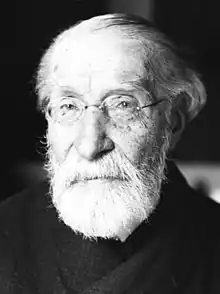François Fertiault | |
|---|---|
 François Fertiault at the age of 100, in 1914. | |
| Born | François Fertiault 25 May 1814 Verdun-sur-le-Doubs, Saône-et-Loire, France |
| Died | 5 October 1915 (aged 101) France |
| Occupation(s) | novelist, poet, essayist, and children's literaturist |
| Spouse | Julie Rodde |
François Fertiault (25 June 1814 – 5 October 1915[1]) was a French novelist, poet, essayist, and writer of children's literature.
Biography
Early life
Fertiault was born in Verdun-sur-le-Doubs, in département Saône-et-Loire,[1] located in central eastern France. His father was a soldier who combatted under Napoléon[1] and died during the German Campaign of 1813. Thanks to the help provided by his uncle and a clerk, François Fertiault attended a school in Chalon-sur-Saône[1] since 1820, where he graduated Baccalauréat at the age of 20.
Early career
During his school years, Fertiault's literary drafts proved to be promising; Fertiault was immediately hired within the editorial board of the newspaper Patriote de Saône-et-Loire and starts working as a literary critic. Then, he settled in Paris, where he worked in the printing house Donbey-Dupré[1] from 8 August 1835. In 1836, he is hired as a secretary in a bank in Bischoffsheim,[1] in département Bas-Rhin, in north-eastern France. He worked there until the French Revolution of 1848.
Publishing
François Fertiault after married Julie Rodde,[1] supported his wife in his literary works, and published several books with her.[1]
Fertiault and his wife settled in Paris a few years later. There, they work as publishers of the periodical Feuilleton de Paris, and then of the Bulletin de Paris between 1858 and 1864. Besides his author career, Fertiault was also a literary critic until the end of his life, mainly dealing with modern and contemporary literature. Thanks to Alphonse Lemerre, Fertiault joined the Parnassianism move and collaborated to the redaction of the famous anthology Le Parnasse contemporain.[2] Fertiault also corresponded with the Norman poet Alexandre Piédagnel.[2][3]
Personal life
Fertiault's wife, Julie, was the daughter of journalist Victor Rodde (1792-1835), he had married her in 1841, and she died in 1900. Their only child died during early childhood. Fertiault retired progressively from his literary career and died in Paris at the age of 101[2] on 5 October 1915.[1]
Works
- Novels and tales
- Arthur ou le dîner de sept châtelains, 1837
- Au clair pays, 1897
- Le dix-neuvième siècle. Satires, 1840 (with Eugène Nus)
- Les imperceptibles, 1903
- Les voix amies, 1864 (with Julie Rodde)
- Poems
- Intimes et familières, 1907
- Le poème des larmes 1858 (with his wife Julie Rodde)
- Rimes bourguignones, 1899
- Sympathies, 1898
- Children and youth books
- La bonne étoile, 1845
- En Bourgogne, 1898
- La chambre aux histoires, 1874
- Pâquerettes et boutons d'or, 1844
- Le petits drames rustiques, 1875
- Essays
- Les amoureux du livre, Claudin, Paris, 1877.[2]
- Dictionnaire du langage populaire Verduno-Chalonnais, Bouillon, Paris, 1898.
- Les drames et cancans du livre, Lemerre, Paris, 1900.
- Les légendes du livre, Claudin, Paris, 1886.
- Les mystères du destin, Lemerre, Paris, 1888 (published under the anagram « Cranisof Altifuret »).
- La vie du livre, Lemerre, Paris, 1909.
Legacy
In Verdun-sur-le-Doubs, Fertiault's natal village, a street is named "François Fertiault".[4]
References
- 1 2 3 4 5 6 7 8 9 (in French) Jean-Claude Polet, Patrimoine littéraire européen : Index général, De Boeck Supérieur, 2000, 600 p. (ISBN 2804131629, read online), p. 377
- 1 2 3 4 (in French) François Fertiault Archived 2015-07-14 at the Wayback Machine, short-edition.com
- ↑ (in French) Le Père Lécureux, bouquiniste : François Fertiault à Alexandre Piedagnel. Lettre et poème autographe retrouvés, le-bibliomane.blogspot.fr
- ↑ (in French) List of streets in Verdun-sur-le-Doubs
Bibliography
- (in French) J. Richardot: François Fertiault. In: Michel Prevost: Dictionnaire de biographie française, Letouzey & Ané, Paris, Bd. 13 (1975), p. 1186 f.
- (in French) Maurice Du Bos: Une poète bibliophile. François Fertiault, Boucheron & Vesseley, Paris, 1905.
- (in French) Gilbert Froidure d'Aubigné: Les hommes de notre temps. Édition „Journal du Parlement“, Paris, 1905, p. 135.
- (in French) Alphonse Lemerre: Le Parnasse contemporain, Lemerre, Paris, 1866.
- (in French) Robert Sabatier, Histoire de la poésie française : Poésie du XIXe siècle, vol. 2, Albin Michel, 1977, 544 p. (ISBN 2226198385), p. 350